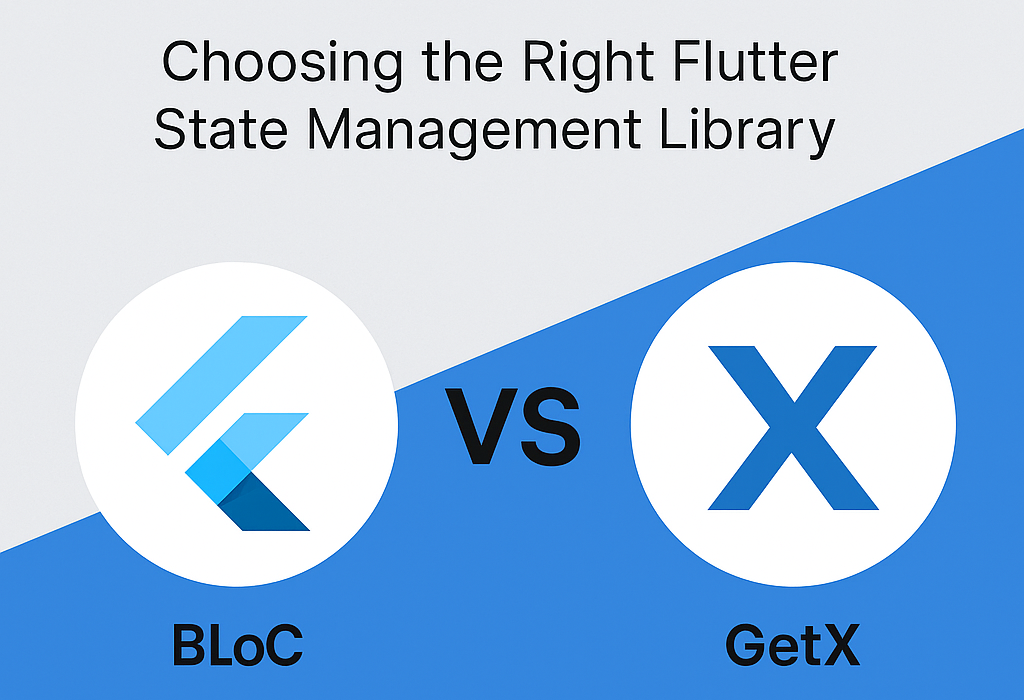Bloc vs GetX: Choosing the Right Flutter State Management Library
Bloc vs GetX is a common comparison Flutter developers face when choosing a state management solution. Flutter, a widely-used open-source framework for cross-platform mobile apps, offers several options for managing state. However, selecting the right approach is essential to building scalable and maintainable applications.
In this article, we’ll compare Bloc and GetX, highlighting their key differences. We’ll also help you determine which one best fits your project needs and development style.
What is Bloc?
Bloc (short for Business Logic Component) is a state management library for Flutter that helps developers manage app state in a predictable and structured way. Moreover, Bloc is based on the concept of reactive programming, where any change in state automatically triggers an update in the user interface.
In addition, Bloc separates an app’s business logic from its UI, which makes the codebase easier to test, scale, and maintain over time. As a result, it is particularly effective for large and complex applications, where managing state without structure can quickly become overwhelming.
You can explore the flutter_bloc package on pub.dev for documentation and installation.
Pros
- Strong Typing: Bloc provides strong typing, which makes it easier to catch errors during development.
- Testability: Bloc’s separation of business logic and presentation logic makes it easier to write unit tests for your application.
- Scalability: Bloc is scalable and can be used in small to large projects, making it suitable for projects of all sizes.
- Community Support: Bloc has a growing community of developers who contribute to its development, making it more reliable and stable over time.
Cons
- Learning Curve: Bloc has a steep learning curve, especially for developers who are new to reactive programming.
- Boilerplate Code: Bloc requires a lot of boilerplate code, which can make it challenging to get started with.
- Complexity: Bloc can be complex, with a lot of moving parts, which can make it difficult to understand and debug.
Use Case: Counter App (Using BLoC)
1. Define Events
abstract class CounterEvent {}
class IncrementCounter extends CounterEvent {}
2. Define State
class CounterState {
final int counterValue;
CounterState(this.counterValue);
}
3. Create Bloc
class CounterBloc extends Bloc<CounterEvent, CounterState> {
CounterBloc() : super(CounterState(0)) {
on<IncrementCounter>((event, emit) {
emit(CounterState(state.counterValue + 1));
});
}
}4. UI (Using BlocProvider and BlocBuilder)
class CounterPage extends StatelessWidget {
const CounterPage({super.key});
@override
Widget build(BuildContext context) {
final bloc = context.read<CounterBloc>();
return Scaffold(
appBar: AppBar(title: const Text('BLoC Counter')),
body: Center(
child: BlocBuilder<CounterBloc, CounterState>(
builder: (context, state) {
return Text(
'Counter: ${state.counterValue}',
style: const TextStyle(fontSize: 28),
);
},
),
),
floatingActionButton: FloatingActionButton(
onPressed: () => bloc.add(IncrementCounter()),
child: const Icon(Icons.add),
),
);
}
}What is GetX?
GetX is a state management library for Flutter that offers a simple and lightweight approach to managing app state. In addition, it is built around the concept of dependency injection, which simplifies the process of managing state and injecting dependencies throughout your app.
As a result, GetX is designed to be both fast and easy to use, making it an excellent choice for smaller applications that don’t require complex state management solutions.
You can explore the Getx package on pub.dev for documentation and installation.
Pros
- Ease of Use: GetX is easy to use, with a simple and intuitive API that makes it easy to get started with.
- Performance: GetX is fast and efficient, with a small footprint that helps to improve the performance of your application.
- Less Boilerplate Code: GetX requires less boilerplate code than Bloc, making it easier to get started with.
- Community Support: GetX has a growing community of developers who contribute to its development, making it more reliable and stable over time.
Cons
- Lack of Strong Typing: GetX does not provide strong typing, which can make it harder to catch errors during development.
- Less Testability: GetX does not have the same level of separation of concerns as Bloc, which can make it harder to write unit tests.
- Less Scalability: GetX may not be suitable for large projects with complex state management requirements.
Use Case: Counter App (Using GetX)
1. Create Controller
class CounterController extends GetxController {
var count = 0.obs; void increment() => count++;
}2. UI (Using Obx)
final CounterController controller = Get.put(CounterController());
Obx(() => Column(
children: [
Text('Count: ${controller.count}'),
ElevatedButton(
onPressed: controller.increment,
child: Text('Increment'),
),
],
));Conclusion
Both Bloc and GetX are powerful state management libraries for Flutter, each with its own strengths and trade-offs. Bloc vs GetX is not just a matter of preference—it’s about choosing the right tool based on your app’s complexity and team workflow.
Bloc offers a more structured and testable approach, making it ideal for large-scale Flutter applications where long-term maintainability is key. On the other hand, GetX shines when you need a lightweight, fast, and easy-to-implement solution with minimal boilerplate.
In the end, your choice in the Bloc vs GetX debate will depend on your project’s size, team experience, and architectural goals. Understanding how each library fits your use case will help you build more efficient and maintainable Flutter apps.
For a broader comparison, read our Flutter State Management Overview, which covers BLoC, GetX, Provider, and more.
Beginner Resources: New to Flutter? Start with our Flutter Basics for Beginners to get up to speed.

